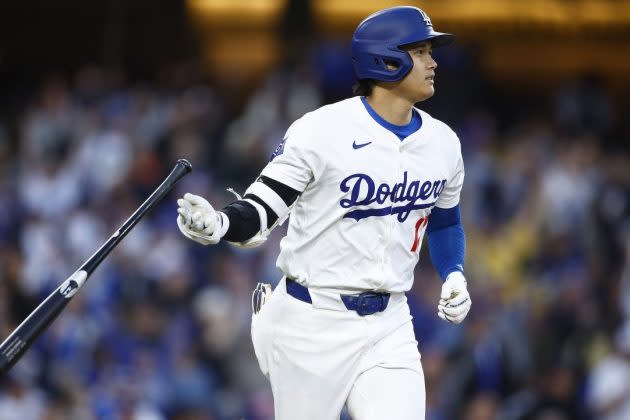
The sports betting controversy involving Los Angeles Dodgers superstar Shohei Ohtani appears headed for a swift resolution.
The U.S. Attorney’s Office for Los Angeles Wednesday announced that Ohtani’s former translator, Ippei Mizuhara, will plead guilty to bank fraud and subscribing to a false tax return. The 39-year-old resident of Newport Beach, Calif., faces a maximum prison sentence of 33 years. However, given his cooperation and guilty plea, Mizuhara will likely receive a much shorter sentence.
More from Sportico.com
Federal prosecutors depict Ohtani as a victim of crime whose wealth and limited English made him easy prey for Mizuhara. U.S. Attorney Martin Estrada said that to “fuel” his gambling habit, Mizuhara “took advantage of his position of trust to take advantage of Mr. Ohtani.”
Mizuhara facilitated his criminal acts by transforming his role from translator to Ohtani’s de facto personal manager. Mizuhara, employed by the Los Angeles Angels and then the Dodgers, used his close relationship to routinely interact with Ohtani’s agents and financial advisors, who did not speak Japanese.
In 2018, Mizuhara assisted Ohtani in opening a bank account in Phoenix, then used his interpreter role to secure the player’s login information. After Mizuhara amassed gambling debts, he fraudulently obtained money from the bank. Mizuhara also used Ohtani’s password and then altered the security protocols so that bank employees would call him—and not Ohtani—for verification of wire transfers.
In addition, Mizuhara impersonated Ohtani when communicating with bank employees. He used Ohtani’s money to pay off gambling debts, dental bills and to buy baseball cards with the intent of reselling them for profit. Prosecutors say Mizuhara fraudulently obtained $16.98 million from Ohtani.
A Mizuhara guilty plea means he will not defend himself in a trial. This was likely a smart move given what appears to be a vast trove of incriminating evidence. Mizuhara, a gambler, may have also been apprised of the long odds. Defendants in federal criminal cases are rarely cleared through a trial. Last year Pew Research found that, in 2022, only 290 of 71,954 defendants (0.4%) in federal criminal cases went to trial and were acquitted. In contrast, 89.5% of defendants, like Mizuhara, pleaded guilty.
Had Mizuhara opted to take his chances in a trial, he might have tried to plant doubt in jurors’ minds by suggesting Ohtani or others around the player were involved in the plot. Ohtani would have almost certainly had to testify. Jurors might have drawn from their common sense and wondered why neither Ohtani nor his agents, representatives or bankers noticed a multiyear and multi-step scheme occurring right under them.
It remains to be seen if Mizuhara’s plea deal will require him to testify against others in related prosecutions. ESPN and other media have reported on government investigations into sports betting operations in California, where sports betting is illegal.
MLB is separately investigating the Mizuhara matter. Earlier this week, commissioner Rob Manfred said the league’s investigation will proceed judiciously and will let the criminal process play out. Given that federal prosecutors believe Ohtani was a victim, it stands to reason MLB will probably reach the same conclusion.
Ohtani, 29, doesn’t appear distracted by the off-field controversy. As of Wednesday, he was leading all of MLB in home runs, doubles, batting average, hits, total bases, slugging percentage and OPS.
Best of Sportico.com
